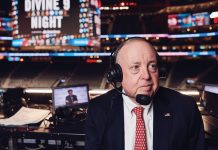
Courtesy Atlanta Hawks/Kat Goduco
It would be understandable if the Atlanta Hawks would rather forget September 2014. Five months after the NBA handed down a lifetime ban to former Clippers owner Donald Sterling for making racist remarks, Hawks majority owner Bruce Levenson preemptively announced he would put the team up for sale in part because of a 2012 email in which he attributed low ticket sales to African American fans scaring away white fans, music that was too urban, and a kiss cam that was “too black.” Hawks GM Danny Ferry didn’t help: That same week, a recording of a 2014 team call leaked in which he was heard describing former NBA player Luol Deng, a Sudanese native, as having “a little African in him.” It was a bad a month, indeed.
In response to the fallout, the Hawks’s then-new CEO, Steve Koonin, indefinitely suspended Ferry, hired law firm Alston & Bird to conduct an investigation, and embarked on an apology tour with local media outlets. He even used the phrase “fo shizzle” in a PSA with Atlanta rapper T.I. After that, Koonin created the NBA’s first-ever “chief diversity and inclusion officer” position in an effort to undo the damage done by Levenson’s and Ferry’s remarks. To help distract from the fallout, the Hawks unexpectedly played their best season ever, and the franchise was subsequently sold for $850 million. Life seemingly went on.
And yet, team managers didn’t forget about their promises. This past Thursday morning, the Atlanta Hawks took another step toward righting past wrongs as the team by hosting the inaugural MOSAIC—Model of Shaping Atlanta through Inclusive Conversations—a series of panels discussions about sports and culture through the prism of, you guessed it, diversity and inclusion. Held inside the Center for Civil and Human Rights, the conversations included participants such as Koonin; Grant Hill, a seven-time NBA all-star and new minority Hawks owner; Nzinga Shaw, the team’s chief diversity and inclusion officer; and Kevin Powell, an activist and author from New York. Moderated by Rohit Malhotra, founder of the Center for Civic Innovation, the discussions covered topics from Dr. Martin Luther King Jr. to life as a minority in America today to the ways sports can foster acceptance.
Shaw, hired in December 2014, spent her much of her first year on the job organizing MOSAIC, an event she would like to see happen annually. But she believes her biggest success so far has been the creation of a 20-member “diversity council” comprised of Hawks employees and community partners tasked with shaping “what diversity and inclusion looks like” for the franchise. The group meets regularly to discuss how the Hawks can better serve all kinds of audiences. Out of that effort, she said, the Hawks decided to become more engaged with the LGBT community. Last fall the team was the only pro sports team to march in the Atlanta Pride parade.
“This function [of this job] is real,” Shaw said. “There are a lot of people that think my job might be window dressing or a bandage to cover a wound. … What we are doing can start from a moment and turn into a movement. Getting everyone to understand has been my greatest challenge.”
From Koonin’s perspective, MOSAIC shows that the franchise is following through on its pledge to “look at the world differently” following the scandal. He believes the organization has grown more conscious about creating an inclusive culture under its new ownership. That effort has included traditional philanthropy efforts like the ongoing construction of basketball courts in poor Atlanta neighborhoods. It’s also extended to the programming of halftime concerts featuring local hip-hop stars 2Chainz, Young Jeezy, and Rich Homie Quan. Like Shaw, Koonin also pointed to outreach to the LGBT community in the form of rainbow-colored team merchandise with the slogan “True Comes in All Colors” and the prominent display of same-sex marriage proposals on the Philips Arena kiss cam.
“We don’t see ourselves as a sports team,” Koonin said. “We see ourselves as a cultural touchstone for Atlanta. We see ourselves as a unifying force that brings together black, white, Muslim, [and] Jewish [people]. Everyone can agree on wanting a great sports team in Atlanta. So the ownership changed, the culture has changed, and we’re just in the infancy of it.”
Though the Hawks started this effort to rebuild its image, the level of consciousness behind the work has spurred league-wide change. When the NBA heard about Shaw’s hiring, its execs created a similar kind of position in its league office. According to Hill, the league has now mandated all teams establish that position within their front offices in the few years.
Hill, recently recognized for promoting tolerance in sports with an Athlete Ally award, struggled to describe what diversity and inclusivity in the future should look like for the franchise he owns. “It’s hard to quantify,” he conceded. “Collectively, we’ll figure it out.” Hosting events like MOSIAC—along with constant internal reflection about the Hawks’s role—is part of an effort push to, as the team’s slogan now reads, be true to Atlanta. At least it’s a start.
“Hopefully, this can, and will, snowball into something bigger,” Hill said, “not just for us and the city of Atlanta, but for the NBA and all professional sports.”













